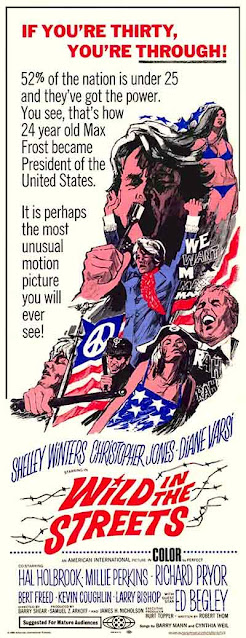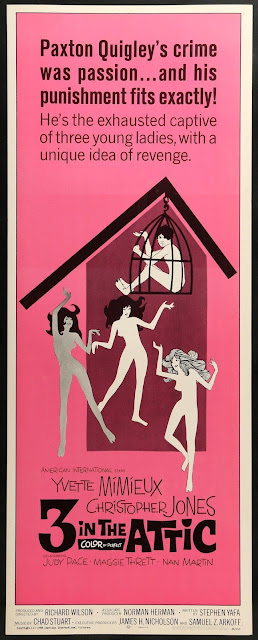When tomorrow is today
The bells may toll for some
The movie Wild in the Streets was released on May 29, 1968 – the day before my 16th birthday.
Click here to watch the trailer for that movie – which depicts current realities much more closely that I would have thought possible ten or twenty years ago.
* * * * *
I saw Wild in the Streets at a drive-in theatre – that's where the movies released by American International Pictures almost always ended up.
 |
American International Pictures (or "AIP") was way, way ahead of other movie studios. The company's based its strategy of making low-budget movies designed to appeal to teenagers on rigorously logical principles, to wit:
(a) A younger child will watch anything an older child will watch;
(b) An older child will not watch anything a younger child will watch;
(c) A girl will watch anything a boy will watch;
(d) A boy will not watch anything a girl will watch;
Therefore, to catch your greatest audience, you zero in on the 19-year old male.
AIP's most famous director/producer was Roger Corman, who later wrote a book called How I Made 100 Movies in Hollywood and Never Lost a Dime. He is best known for his series of horror movies based on Edgar Allan Poe stories (all of which were in the public domain, which obviated the need to pay royalties), but he also directed the famous Peter Fonda motorcycle movie, The Wild Angels, and the Shelley Winters gangster movie, Bloody Mama (which featured a very young Robert DeNiro).
* * * * *
In 1968, the voting age in the United States was 21. In Wild in the Streets, a Kennedyesque Senate candidate calls for the voting age to be lowered to 18 – that actually happened three years later, when the 26th Amendment was ratified – and asks rock star cum revolutionary Max Frost to help make that happen.
But when Frost performs at a televised rally for the candidate, he shocks his sponsors by proposing a more radical revision of the voting age in a song called "Fourteen or Fight."
Click here to see the scene from the movie that features Max and the Troopers playing "Fourteen or Fight."
(Did you notice who the drummer in Max's band is? That's right – it’s Richard Pryor.)
Max's anthem triggers massive protests and demonstrations throughout the country, and the old-guard politicians cave in almost immediately, agreeing to lower the voting age to 15. The kids quickly agree to this "compromise" and things quiet down temporarily, but the genie is out of the bottle.
 |
| Christopher Jones as Max Frost |
Max's girlfriend is elected to Congress, where she introduces a constitutional amendment to allow 14-year-olds not only to vote, but to hold political office. Max's allies spike the Washington, DC water supply with LSD, and the amendment passes.
Max is later elected President, and his administration rounds up everyone over 35 (including his mother, memorably portrayed by Shelley Winters) and sends them to "re-education" camps where they are given daily doses of LSD and live happily ever after.
* * * * *
The star of Wild in the Streets was a young actor named Christopher Jones – he was the James Dean of his day, but is virtually forgotten today.
Jones, who once went AWOL from the army to make a pilgrimage to Dean's family home in Indiana, was cast in a Broadway production of the Tennessee Williams play, The Night of the Iguana, when he was barely 20. He then studied at the Actors Studio under the legendary "method acting" proponent, Lee Strasberg. A few years later, Jones moved to Hollywood and landed the starring role in a TV series called The Legend of Jesse James.
Jones starred in two AIP movies that were released in 1968 -- Wild in the Streets was followed by Three in the Attic, a movie guaranteed to inflame the fantasies of male teenagers even more than Wild in the Streets.
 |
Here's where it gets really good. You know how the three women decide to avenge Paxton's infidelity? They lure him to the dormitory where one of them lives and lock him in the attic. They punish him by taking turns having sex with him 24/7. (I kid you not!)
Apparently this is too much of a good thing for even a healthy young male like Paxton, who is quickly worn to a frazzle – and goes on a hunger strike to protest his ill-treatment. After a couple of weeks, Paxton's absence from class is noticed, and rumors about what is going on in the attic get back to his college's dean. Paxton is released from captivity just in the nick of time and is taken to the hospital to recover from his ordeal. The authorities decide that because Paxton was such a cad, the three women should not be punished.
Three in the Attic, which was filmed on the UNC campus in Chapel Hill, has some remarkably bad lines. My favorite is the line Paxton uses to pick up Yvette Mimieux: "You have nice hair – it fits the mood of your butt." (Her response is scornful – "You're infinitely boring" – but it doesn't take long for him to bed her.)
* * * * *
In 1970, Jones appeared in a serious, big-budget movie – Ryan's Daughter, a romantic drama set in Ireland during World War I and based very loosely on the novel Madame Bovary. Ryan's Daughter was directed by legendary British director David Lean – who directed the legendary epics The Bridge on the River Kwai, Lawrence of Arabia, and Doctor Zhivago – and also starred Robert Mitchum, Trevor Howard, John Mills (he's the village idiot), Leo McKern and Sarah Miles.
Click here to watch the trailer for Ryan's Daughter.
The role of the young British army officer that went to Jones was originally written for Marlon Brando. Peter O'Toole, Richard Harris, and Richard Burton were also considered for the role, but Lean decided he wanted Jones. The two men did not work well together.
 |
During the filming of Ryan’s Daughter, Sharon Tate – the wife of director Roman Polanski – was killed by Charles Manson and his followers. Jones later claimed that he was the father of the baby Tate was pregnant with when she was murdered.
After Tate's death, Christopher Jones walked away from his movie career. He moved back to Los Angeles and devoted his energy to painting and to being a father to his five children.
* * * * *
Jones stuck to his guns and shunned Hollywood for a quarter of a century. Among the movies he could have appeared in but turned down was Pulp Fiction.
But in 1996, Jones had a change of heart and agreed to do a cameo in a crime movie called Mad Dog Time, which featured Jeff Goldblum, Richard Dreyfuss, Gabriel Byrne, Ellen Barkin, Diane Lane, Burt Reynolds, Richard Pryor, Billy Idol, Paul Anka, and Rob Reiner – among others.
One reviewer said that film was "jaw-droppingly incoherent." Siskel and Ebert picked it as the worst movie of the year, and Ebert said it was "the first movie I have seen that does not improve on the sight of a blank screen viewed for the same length of time."
That was apparently enough for Jones – he never appeared in another film.
[NOTE: Jones died of cancer in 2014, leaving seven children. He was 72.]
* * * * *
"Shape of Things to Come" – today’s featured song –was written by the husband-wife team of Barry Mann and Cynthia Weill, who also wrote "You've Lost That Lovin' Feelin'" (a huge hit for the Righteous Brothers), "Kicks" (Paul Revere and the Raiders), "On Broadway" (the Drifters), "We Gotta Get Out of This Place" (the Animals), "I Just Can't Help Believin'" (B. J. Thomas), and many other hit songs.
The song is credited to Max Frost and the Troopers, which was Christopher Jones's fictional band in Wild in the Streets. It appears that the singer was Paul Wybier and the band was Davie Allan & the Arrows, a Southern California surf music band that was signed by record producer Mike Curb in 1964. Curb later signed a deal with AIP to supply it with movie soundtracks. Allan – best known for his heavily distorted "fuzz" guitar sound – had his biggest hit with "Blue's Theme" an instrumental from the soundtrack for The Wild Angels.
Click here to listen to today’s featured record.
Click on the link below to buy the original “Shape of Things to Come” from Amazon:



No comments:
Post a Comment